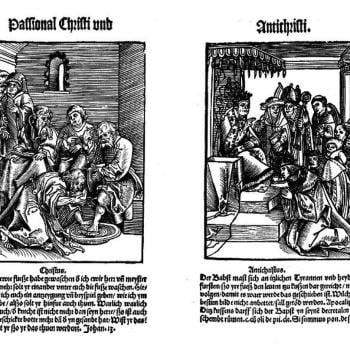After reading my first Patheos blog, some folks reminded me that some Pagans are conservatives and asked me to address this issue. Theirs is an interesting question. I think the answer I will give will be mostly unexpected because of the almost complete collapse of intelligent discourse in our country. Speaking broadly, we use political terminology with almost no agreement on what words mean.
And so, to answer the question, I need to digress a bit into history.
Conservatism arose during the late 18th and early 19th centuries in response to liberalism, which came first. During the Enlightenment, liberalism had two strong political components: a belief in equal rights, which put it at odds with traditional authority by kings, priests, and aristocrats, and a shared belief that through reason, we could remake our world for the better. The opening paragraphs of the American Declaration of Independence are a classic statement of both themes.
Edmund Burke, the first real conservative theorist, supported the colonists in their revolt against the crown because the king had violated the historically grounded and evolved rights of Englishmen. But he did not refer to the rights of all people to government by consent. He and Paine (and most of the Founders) were on the same side but for interestingly different reasons.
The implications of Burke's different argument came to a head during the French Revolution, when he wrote a famous critique of the revolution and predicted it would end badly. The liberal Thomas Paine, who helped ignite the American Revolution with his The Rights of Man, responded from a pro-revolutionary direction. In fact, the French Revolution ended badly, and Paine almost lost his head to the guillotine during the Terror. On the surface, Burke won the debate.
From that time on, genuine conservatism has taken a basically ecological view of society: we are embedded in intricate relationships within a matrix of customs we do not fully understand. We should honor those customs except when the need to change them becomes very obvious, because as with farming, indiscriminate use of pesticides to impose our will on a complex system will almost always make matters worse. What is bad when seen in isolation might perform very positive functions for the social ecosystem as a whole. Think of wolves in Yellowstone, especially from the standpoint of an elk.
As a Pagan liberal, I agree with Burke and with Paine. Our revolution was justified both by the logic of the Declaration of Independence and due to the king's violation of the customary rights of Englishmen.
But to gain a deeper Pagan perspective we need to look again.
Christian contexts vs, ecological insight
Thomas Paine incorporated Christian assumptions into his freethinking liberalism, and one of the most important ideas proved destructive: that we stand outside of nature. Thus, for Paine, once freeing ourselves from "superstition" through our reason can reconstruct our world. Paine and liberals in general had a correct insight into the basic moral equality of every person, but the people they recognized as equal were abstracted from their culture and environment. They were not only morally equal, but also politically and socially equal. Englishmen, Frenchmen, Americans, Chinese, and Aztecs were equal.
What Paine missed was that all these people had to discover their own roads to recognizing this moral equality. It could not simply be imposed from without or blindly applied as another culture's solution. This is the error of those who argue democracy can be exported on the tips of bayonets and through the persuasion of "freedom bombs."
Paine approached political reform as if he were a farmer who focused only on the genetics of the seeds and ignored the soil. When the soil was compatible with the crops being planted, the outcome could be favorable, but when the soil lacked essential nutrients, in the absence of careful cultivation the outcome would be destructive to soil and crops alike. America had good cultural soil and the France of the time was far less amenable to free institutions. Despotism had depleted its cultural soil. What worked here did not work in France.
Compared to Paine, Burke was acutely aware of the importance of the soil, and of the need to respect the social ecosystem, work within it, and seek to cultivate positive changes rather than simply impose them. For Burke, people were always within a society that made them who they were, and any changes had to respect that society. Some changes were likely impossible any time soon. Our ancestors and our descendents mattered, and we lived in our society with the responsibility of passing it on in good shape to the next generation.





